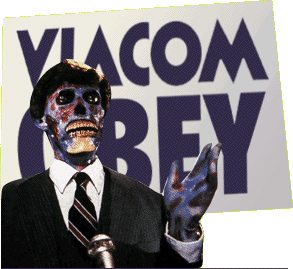
Growing up with the great sci-fi and media conspiracy films of the 1970s and '80s, I remember being overwhelmed by the hypothetical scenarios in which giant, faceless, evil corporations sustained their omnipotence over an ignorant populace through media disinformation.
But I was a kid, and the movies were set in the future, so I took a kind of mañana attitude toward the prospect of a totalitarian media society, thinking "not in my lifetime." Now the possible Viacom/CBS merger has brought that future to the present. What better time to take a second look at some of the greatest "evil corporation" movies of all time and see how prophetic they were.
Norman Jewison's Rollerball (1975)
In the far future, the world is run by a handful of corporations, each performing some essential function: Food, Transport, Luxury, and Energy. They exert totalitarian control over all knowledge and information, all the while competing with each other in a sadistic game called rollerball -- a high-body-count combination of roller derby, hockey, and pinball.
The Energy corporation gives Rollerball hero Jonathan E. (James Caan) any perk he wants -- ranch house, state-owned concubines, lots of Quaaludes -- but what he really wants is information about his employers. This only riles the company chairman (John Houseman), who tries to convince Jonathan that "corporate society takes care of everything; all it asks of anyone is not to interfere with management decisions."
It's no longer fiction. Today's media world is also dominated by a handful of giant and ever-growing corporations: Time Warner, Disney, Rupert Murdoch's News Corporation, Bertelsmann, and Viacom. (If the Viacom/CBS merger goes through, Viacom will replace Time Warner as biggest media conglomerate.) As in Rollerball, these corporations also take a "don't worry, be happy" approach to consumer knowledge about their internal affairs. As a result, they buried any discussion of the 1996 Telecommunications Act, which gave them, gratis, a piece of the public digital spectrum (worth about $70 billion), thereby allowing them to create more channels.
John Carpenter's They Live (1988)
Here's one of the rare sci-fi films that appeals to media conspiracy buffs and World Wrestling Federation fans alike. In late-1990s America, an economic depression polarizes the nation. Aliens, who take the form of Viacom-like corporate execs, control the masses of unemployed through subliminal media messages.
An underground movement, improbably led by a reluctant Roddy Piper, invents special sunglasses that let them see which humans are really aliens and decode alien subliminal messages: Dollar bills suddenly read "This Is Your God," billboard ads command people to "Marry and Reproduce," "Consume," and "Sleep." The revolutionaries manage to destroy the alien satellite and give the people "real" news and information.
It's no longer fiction. At the end of a recent episode of Dharma & Greg, during the kaleidoscopic montage that accompanies the credits crawl, ABC flashed the message "Keep watching the pretty pictures." I thought, "Wow, that's so They Live." I just wish I had the special glasses to decode ABC's real message, which would probably have read "Don't channel-surf." But mainly, it would be fun to have those glasses just to see what Diane Sawyer really looks like.
Paul Michael Glaser's The Running Man (1987)
A sci-fi media-bashing flick starring Arnold Schwarzenegger, Dweezil Zappa, Richard Dawson as a sadistic game show host, and featuring a pre-governor Jesse Ventura as "Captain Freedom." The premise: In 2017, the world economy has (once again) collapsed, and a police state controls all media. When military cop Arnold refuses to fire on food rioters, he is framed as the "Butcher of Bakersfield," using doctored video footage to make him look like a gun-happy psychopath. Ultimately, though, Arnold helps the resistance movement take over the airwaves and run the "real" news footage.
It's no longer fiction. The '90s corporate media have their share of hoaxes: Remember that 1993 Dateline NBC fiasco when the show's producers rigged GM pickup trucks to explode by overfilling their gas tanks and placing model rocket engines on them? That was zany, but most media bias occurs through the more prosaic route of omitting alternative viewpoints. Just last month, Hugh Downs revealed on his final 20/20 appearance that ABC had censored his attempts to question the nation's drug policies and advocate the decriminalization of marijuana. To top things off, an apparent edit jump in the interview raised questions as to whether Downs was still being censored by ABC.
Sidney Lumet's Network (1976)
In this media bonfire classic, lowest-rated network UBS decides to get rid of anchorman Howard Beale (Peter Finch), who freaks out, threatens suicide, and then becomes a network prophet whose nightly shtick raises ratings. The network exploits Howard's insanity -- until he goes too far. One night, he decides to torpedo Saudi attempts to buy out his network's parent company and he's subjected to the wrath of its conglomerate head (think Viacom chairman Sumner Redstone), who tells him things like "the individual is dead," and "democracy is a dead concept."
Even this is not fiction. Media democracy may become even more moribund if Viacom buys CBS, since no one can realistically expect the network to give objective coverage of anything going on in one of Viacom's subsidiaries. I mean, if Redstone decides to make Viacom-owned Blockbuster the front for an underground human fetus exchange ring, CBS won't cover it.
Since there's nothing quite like thwarting a corporate merger, why not take a moment and dispatch an email to the Justice Department's antitrust division. Let them know your concerns about the Viacom deal, media concentration, and its danger to free speech and public control of the airwaves. In the spirit of Network's Howard Beale, tell them, "I'm mad as hell, and I'm not going to take it any more!"
Peter Braunstein writes about film and pop culture for the Village Voice, and is currently co-editing an anthology on the 1960s counterculture.
